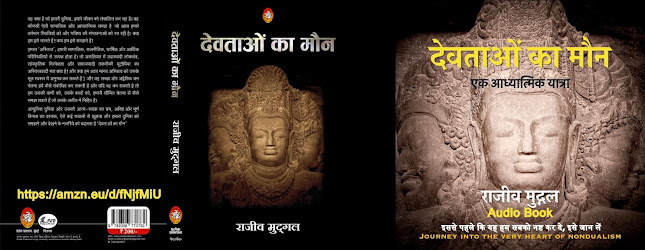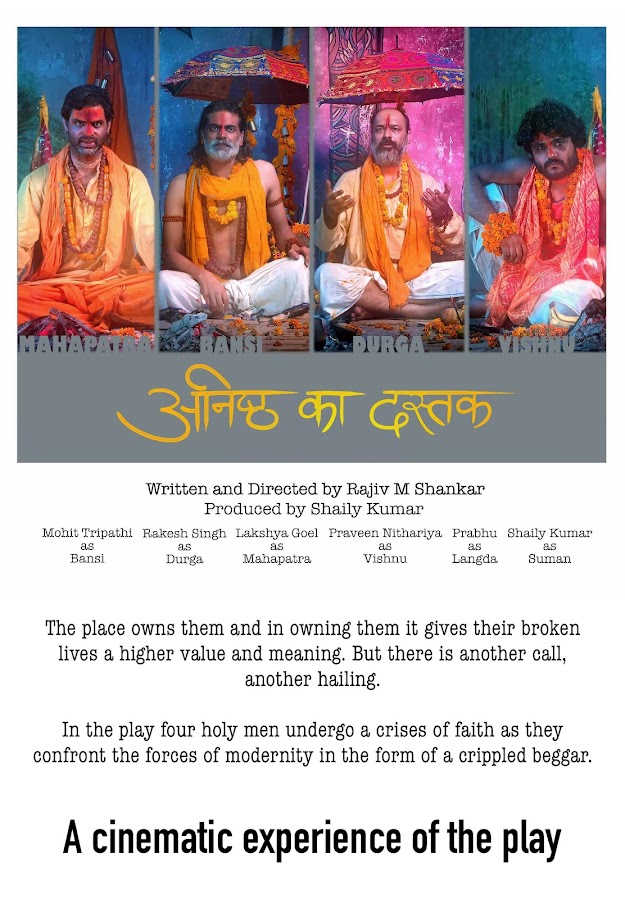The Loom Of Time
The Loom Of Time
Novella (extracts) - 1990
Picture Credit - Shashwat
I am a journalist, an unimportant one, for that matter a useless one. Like everyone else I was pleasantly surprised at my selection. I was afterall not on their payroll like other writers, poets, journalists and media activists were. I was neither talented, nor sober thinking, nor was I an intellectual, nor a DU or JNU professor who as influencers were a highly priced commodity.
My selection was and remains a mystery.
On the flight I was given a backseat, almost 20 rows separated me from the rest. All those professors must have been happy about my predicament and I am sure that my separation from the rest was seen fitting to my status and stature. I could almost hear them gossip that my selection was part political rather than on merit because the only book I had published was on the similarity of Arkaimian mysticism to Ramanuja experience of God as saturated essence, a book liked by no one, read by no one and ignored by the general intelligentsia.
But call it luck, my companion next seat turned out to be a beautiful young lady with golden hair and sparkling eyes.
Half way down the flight, she introduced herself to me. She was a teacher in one of the provincial town 40 km to the east of Moscow.
Then she said something that took me by surprise.
”You were wondering”, she said, “as to why you were selected weren’t you, but to know this ‘why’, you have to figure out as to what grants your reporting its stable and unquestionable authority…and does this unshakable authority of your words presupposes an excess of uncertainty. After all It is not so obvious that all things true presuppose concealment.”
"I don’t understand what you mean" I said
"The War between the titans and the gods have just begun" she said, "and our Columbuses have to find their way to their own India, and we are not even ready for a 100 years of turmoil….in short we don’t even know where to make a start.
“That should not be difficult” I said , “There is nothing new under heaven and earth, the difference is how you arrive and depart…You arrive at it by wandering into its wilderness, into its openness… and remaining open to it when you depart."
"Is that all".
“Yes…" I said
Day One & Two (….)
Day Three
As promised, they took me to the countryside the next morning and showed me one of their greatest achievements, the cooperative farm, the kolkhoz.
We reached there just in time to witness farmers toiling in the farm. They had their shirts wrapped on their waist, were tall and despite their charming smile, appeared thin and frail. Their bodies had no fat and you could almost count their ribs. Even their facial features spoke of their pain and hardship. The skin on their faces had receded giving their cheekbones contours that thinly hid the curves of their skull.
Having parked the tractor at the collective shed, Vadim, a young peasant, wiped his sweaty forehead with his shirt and took us to his house. We walked a couple of miles. Once inside, his wife promptly served us tea and bread. Then he introduced me to his mother Larina. She was thin, short and had sparkling eyes and a permanent smile hung on her otherworldly face. She welcomed me by taking my hand in hers as if to feel something, then she kissed me on my forehead and made me sit on an old wooden chair. Seeing me sit on the chair the family burst into spontaneous joy, then his son informed me that the chair belonged to his grandfather, and I am the second person allowed to sit on it. Who was the first I asked. Oh it's a long story, he said. At lunchtime we were served hot potatoes sprinkled with salt and chilli. I was told that that's all they have and that's all they eat…tea and bread are reserved only for guests of honor.
I had heard about the Potato eaters, but had never seen one. I learnt from the villagers that the village today exists only to placate the demands generated by the city. Once the pride of the steppes, the rural life has been transformed into an apartheid system that spawned state sponsored slavery. The new Masters only aim was to maximise production so that cities can be fed, offices built, industrial parks and factories financed, schools paid for, and hospitals run on charity. Their so called great pension system was built not on brick or mortar but on bones and blood of the farmers. Their slavery was used to generate wealth that paid for the urban social insurance schemes that secured the salaries of the urban workers, their cadres and their corrupt officials.
The collectivisation of farms is shrouded in a mystery. Someone somewhere seemed to have convinced those in power that the easiest way to achieve rapid industrialization was to capture and enslave the peasants and take absolute control of their agricultural farmland. Military organisational powers were used to get the peasants in line with party ideology, and cadets were given social and political immunity to execute their plans and even use excessive force if needed. This allowed them to buy food grains at no cost and sell them at premium rates thus generating enough capital to finance their grand industrial projects.
Where Ideology matters more than the lives of the people, any complaints by them are squashed using both physical as well as ideological means. Even though it was obvious that the party officials worked hard to make the peasants' lives miserable, any sign of sympathy or concern for them meant physical disappearance. ‘How…!’, they would argue before shooting you in the head, ‘how could you even think, how can this thought even arise inside your rotten head, look around you, suffering has been conquered, we have achieved socialism, the ways of landlords and bourgeoisie have been smashed, exploiting classes have been wiped out, peasants have been liberated, today they possess everything, there is no one here to exploit and abuse them, so how can the idea of injustice even arise.’
Those who complained about the principles of socialist self-management were labeled ‘dangerous’ and were persecuted promptly. Ideological commitments and fear of persecution forced sensitive people to turn an blind eye to the realities of the countryside.
“Nojta o Nojta,why has your light abandoned us,who will now heal uswho will now guide usthe blizzard is blazingits tearing our houseour day’s turn darkour spirit is lost.Nojta o Nojta,Don’t take away your handDon’t forsake us to blindnessLight of our eyesLight of our voiceWithout you my beautiful oneOur roads peter outOur children scatter.Nojta o NojtaOur world cracksLike a broken ship,our heart sinksPain engulfs usSorrow drowns us,without you my sweet oneOur way is lost.Nojta o Nojtacome back to us.”
It is then that I saw all three hanging from the ceiling. Even to this day I am possessed by the question as to why they left me alive, why did they not hang me along with them.”
Vadim informed me that 11 years later Alyosha visited their village with his beautiful 5 year old girl. The villagers could not recognise him, but my mother did, and when he saw my mother who had by now grown into a hauntingly beautiful woman, he froze and fell unconscious. The little girl panicked and started to cry, ‘papa, papa’, but the man lay frozen, his eyes fixed on mama. Fearing that he may attract unwanted commotion, mother took him in and tried to nurse him back, but the girl kept hitting my mother and pulling her by her hair shouting ‘witch, let go of my papa’ and then in the middle of the night she ran away.”
“You know,” he continued, “how unforgiving and heartless winter nights are, so sensing trouble mother went out in search of her, but she was nowhere to be found. She searched for her the whole night, and after several hours of searching, weak and exhausted she returned only to find that Alyosha too had left. He left, leaving all his belongings including his woollen coat, wallet and his Red Card. We never heard from him again nor received any news about the girl.”
When asked, “What must have spooked him like this”, Larina replied; “He must have seen my mother in me”, then continued after a short pause, “I feel sorry for him and his daughter.”
“Why did he come back” I inquired,
“Something deep inside him was broken…the burden of living with a broken soul is unbearable.”
When asked “Does she regret the destruction of her village in favour of the urban”, she replied: “Destruction we can deal with but Devastation is beyond human capacity to repair.”
About the current leadership she said, “We should not just blame the rulers, they have their faults, but the true source of corruption lies within us.”
About the great progress in science and engineering she said
“You see all these great men, astronauts, engineers, airplane and rocket scientists, they all came from villages just like ours, but the brilliance that had launched their spirit has vanished from the countryside. The city lacks a soul… it can never produce the exceptional.”
When asked what she expects from the future she said, “The soullessness is spreading…they were quick to announce the death of God but haven’t found any replacement for words like sin, crime and redemption…It will be too late before they realise what they have done.”
I couldn’t sleep that night, Larina's voice kept ringing in my ears, I kept thinking as to how we got here, and where was it all heading.
Next morning l decided to once again go to the forbidden library and find the hidden source, the loom that was said to be weaving the fabric of our times.
Day four (The Loom Of Time)


